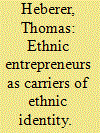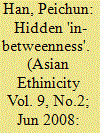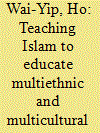|
|
|
Sort Order |
|
|
|
Items / Page
|
|
|
|
|
|
|
| Srl | Item |
| 1 |
ID:
082443


|
|
|
|
|
| Publication |
2008.
|
| Summary/Abstract |
In this article, the author examines the connection between Yi (Nuosu) entrepreneurship and ethnic identity. First the term identity is discussed, and then important factors for creating identity among Nuosu entrepreneurs are outlined. Concerning the Nuosu-Yi, until today the clan plays a predominant role. Through entrepreneurship, clan-transcending institutions and a clan-transcending ethnic identity are emerging. The author follows up by addressing identity issues in terms of the rewritten official Chinese history on the Yi. To understand the entrepreneurs' concept of identity, it is necessary to understand that their discourse on questions of status and identity very often coincide with arguments advanced by Yi scholars. Nuosu entrepreneurs, as a new economic and social elite, thereby contribute to the shaping of a new Nuosu collective consciousness. Time (history) and space (Liangshan) are crucial markers of Nuosu identity, but the author argues that economic success is an additional factor for developing a new identity as well. Notably, entrepreneurs are both carriers of ethnic symbols and agents of modernization who actively shape identity.
|
|
|
|
|
|
|
|
|
|
|
|
|
|
|
|
| 2 |
ID:
082444


|
|
|
|
|
| Publication |
2008.
|
| Summary/Abstract |
This article offers an analysis of the dynamic interplay of ogenous and exogenous forces that create the complexity of immigrant entity. It examines cultural identity and the related discourse of one particular immigrant group, the 'post-war immigrant aiwanese, in contemporary Japan. This group came to Japan after the end of Second World War. They have experienced complex transitions in both legal status and self-identification. Constituted from the legacies of Japanese colonialism and Chinese aonalism,he post-warmigr Taiwanese constantly negotiate and redefine their 'neither here, nor there' identities and thus constitute a distinct case within the population of overseas ethnic Chinese. Japan, widely considered to be a society of racial and cultural homogeneity, faces an increasing influx of migrants, in particular those from East Asia in recent years. Immigration thus leads to a broad range of concerns in contemporary Japanese society. While previous literatures of the Chinese and Korean Diaspora are widely researched, there is a vacuum on Taiwanese Diaspora in the associated scholarship. This study investigates the Taiwanese migrants' cultural adaptation and socialization under the Japanese discourse through literature reviews and field study. This paper argues that the post-war migr Taiwanese have constructed a transnational identity hidden in-between two cultures of Japanese and Chinese. In other words, this paper attempts to offer a perspective of Taiwanese under Japanese colonialism and Chinese nationalism that transcends the 'identity struggle' commonly experienced by immigrants around the world. This group of Taiwanese migrants in postwar Japan struggle with surveillance, assimilation, resistance and identity confusion. To balance between a survival strategy overseas and a primordial attachment to the motherland, their identification with group boundaries may shift in accordance with a variety of situations.
|
|
|
|
|
|
|
|
|
|
|
|
|
|
|
|
| 3 |
ID:
082445


|
|
|
|
|
| Publication |
2008.
|
| Summary/Abstract |
The rapid expansion of higher education in China is bringing together two phenomena, internationalization and multiculturalism. This study explores the question of what Chinese universities are doing to bridge the gap between these two. Three types of higher education institutions attended by minority students are selected: a university under the governance of an ethnic autonomous region, located in Inner Mongolia; a university under the Central Ministry of Education in Beijing, and a university under the Ethnic Affairs Bureau, specifically designated for nationalities, in Hubei Province. A content analysis of selected relevant documents and interviews with university academic/administrative staff, Han and ethnic minority students were carried out. Chinese universities seem more than willing to internationalize for status advancement. However, multiculturalism in the sense of recognition of ethnic minority cultures, is not viewed as bringing higher status. The implications for bridging internationalization and multiculturalism are raised
|
|
|
|
|
|
|
|
|
|
|
|
|
|
|
|
| 4 |
ID:
082442


|
|
|
|
|
| Publication |
2008.
|
| Summary/Abstract |
In the post-9/11 era, growing scholarly literature and social concern have focused on Islamic education in Muslim-majority countries and for Muslim minorities in the West. However, public attention and academic research concerning the teaching of Islam as a world religion and a commonly shared human civilization, are barely understood in secular contexts and in public education. This issue requires more attention, especially in Asia. For the sake of future dialogue and further discussion, this paper is a tentative attempt at initiating this understudied issue of teaching Islam as multicultural literacy. It inquires about the pedagogy of teaching Islam in an East Asian context by first briefly reflecting on the dilemmas of introducing Islam to the West and its implications for the university curriculum. Departing from the experience in North America and European societies, this article then attempts to explore alternative pedagogical discourse in teaching Islam to Chinese students in the East Asian context by considering its specific geographical position in global politics and the recent development of Hong Kong. This article finally foresees the developing pedagogy of Islamic teaching that challenges students to break away from the media clich and apathy towards human suffering, leading them to understand that they themselves are the potential peacemakers of a future global multiethnic and multicultural society.
|
|
|
|
|
|
|
|
|
|
|
|
|
|
|
|
|
|
|
|
|